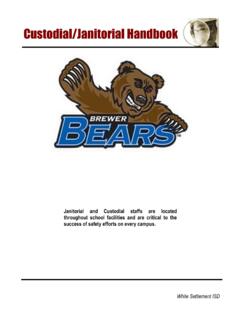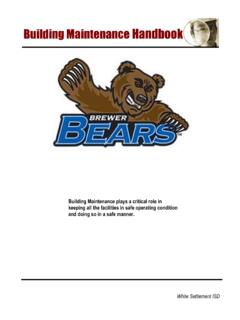Transcription of Warehouse Handbook
1 Warehouse Handbook Warehouse operations are by definition behind the scenes but the safety practices of all personnel must be at the forefront of all actions. White Settlement ISD. Warehouse Handbook Warehouse Operations Section I Safety Rules Section II New Employee Training New Employee Introduction New Employee Orientation Section III Safety Inspections Employee Request for Correction of Safety Hazard Employee Safety Observation Custodial/ Janitorial Safety Inspection White Settlement ISD. Warehouse Handbook Safety Rules White Settlement ISD. Warehouse Handbook INTRODUCTION/OVERVIEW.
2 On the job accident prevention is the responsibility of all the district's employees. It is the further responsibility of each employee to correct or report any unsafe condition or practice that he or she may observe. Each supervisor is responsible for prevention of accidents to employees working under his/her supervision. It is the supervisor's responsibility to train these employees to enable them to work safely and efficiently. GENERAL SAFETY RULES. The following are some important general safety rules that each employee is required to follow, regardless of work assignments.
3 1. Lifting improperly is a major factor of the tremendous number of claims for back injuries. The following procedures should be followed: a. Size up the load; make sure it is stable and balanced. Test the weight to ensure you can lift it yourself. b. Plan the job. Ensure that your path of travel is clear and that you have identified the location where you will place the load. Establish a good base of support. Use a wide balanced stance with one foot ahead of the other. d. Bend your knees and get as close to the object as possible. Lift with your legs and not your back.
4 E. Get a good grip on the object to be lifted. Make sure you can maintain your hold throughout the lift and won't have to adjust your hands later. f. Lift gradually, don't jerk, but use a slow steady movement. g. Keep the load close while carrying; this prevents you from arching your back and adding additional stress to your back. h. Pivot; don't twist when you need to change directions. Move your feet in the direction of the lift. Twisting is especially harmful for your back. i. If the load is too heavy either enlist another helper or use a mechanical device.
5 2. Good housekeeping is an aid to safety. All employees shall keep tools, equipment, and work areas clean and orderly. 3. Keep aisles stairways and exits clear of boxes and other tripping hazards. Do not obstruct exits. 4. Clean spills immediately. Mark the spill if you must leave to retrieve assistance or additional supplies. 5. Each employee should know the location of fire extinguishers in their work area. The area in front of a fire extinguisher should be kept clear for ready access. Employees should White Settlement ISD. Warehouse Handbook not fight fires that are beyond their fire training and limitations of the available fire fighting equipment.
6 When in doubt, call professional help and evacuate to a safe area. 6. Gasoline will not be used as a washing or cleaning fluid. When cleaning solvent is required, use an approved cleaning solvent. 7. Material will be stored in a safe and orderly fashion. Flammable liquids should be stored in an approved Flammable Storage Cabinet. 8. Any employee, while on duty or on district property, who possesses, sells, or receives any illegal drug or who is under the influence of drugs or alcohol, will be discharged and, in appropriate situations, referred to law enforcement authorities.
7 9. Smoking will not be allowed at any facility. 10. Use caution when opening doors which serve two-way pedestrian traffic. 11. Use a stepladder or a step stool for reaching above shoulder height. never stand on the cap of a ladder. 12. While in a district vehicle, seat belts are required to be worn at all times. Do not disable airbags unless you have written permission from your Supervisor. 13. Do not operate machinery that you are not familiar with and have not been trained to use. 14. Inspect all tools and equipment prior to use to ensure they are in working order and do not present a hazard.
8 15. After use put all tools/or equipment back in their proper place. 16. disconnect all electrical cords by grasping the plug and carefully disengaging; never yank by the cord. If an electrical cord is frayed or wires are exposed remove it from service. 17. Use handrails when using the stairways. never take more than one stair at a time. 17. Only qualified, designated employees should work on electrical wiring and equipment. 18. Horseplay or practical jokes will not be tolerated. 19. Material Safety Data Sheets must be available, at the point of use, to any person who requests this information.
9 20. Report all accidents to your supervisor. 21. Report all unsafe or broken tools and equipment to your supervisor. Mark the tool or equipment so that no one else will use. 22. Observe all warning signs, safety bulletins and posters. 23. Do not do any job that appears unsafe; ask your supervisor for guidance. White Settlement ISD. Warehouse Handbook Warehouse SAFETY RULES. The following are some important general Warehouse personnel safety rules that each employee is required to follow: 1. Before loading and unloading a truck, set the brakes. 2. Do not move a truck before all persons are properly seated or protected from the hazards of a shifting load.
10 3. Do not misuse forklifts or pallet jacks. 4. High lift rider trucks must be provided with an overhead guard. 5. Know the location of eye wash stations when handling batteries to be charged. 6. NO SMOKING signs should be posted. 7. Lower forks to the ground when the truck is not in use or the operator is more than twenty five feet away. 8. Always travel with the load lowered. 9. Check the trucks daily or after each shift. 10. Travel backwards if the view to the front is obstructed by the load. 11. Do not overload lifts or hoists. 12. Do not allow anyone to stand or walk under a load.

